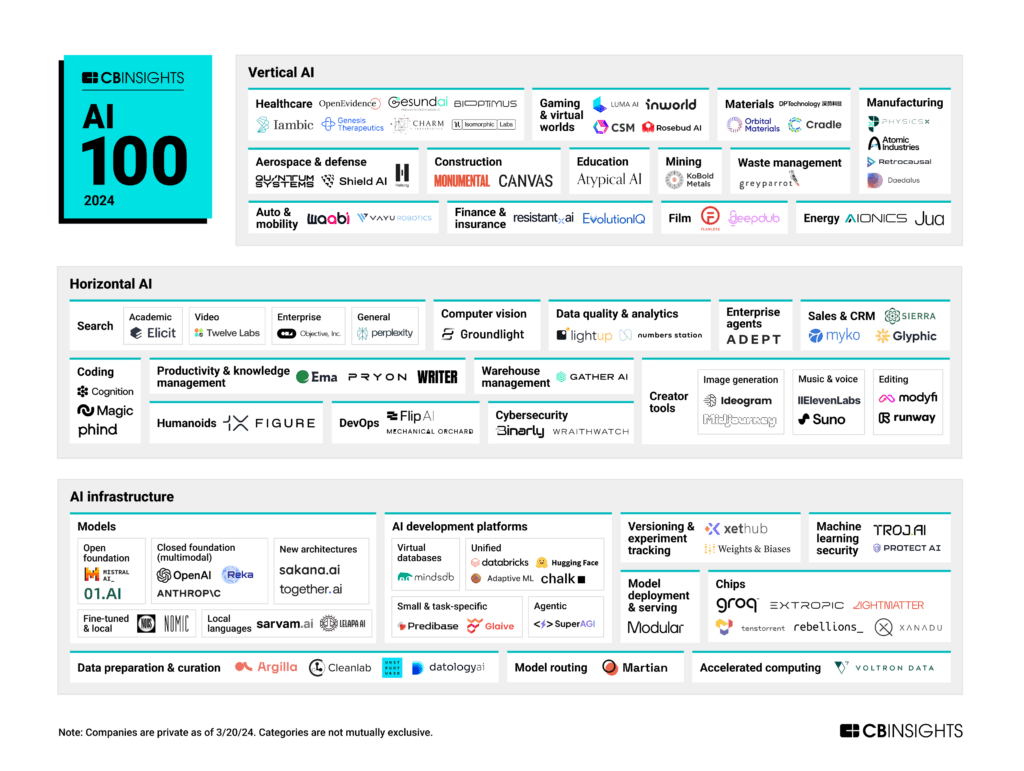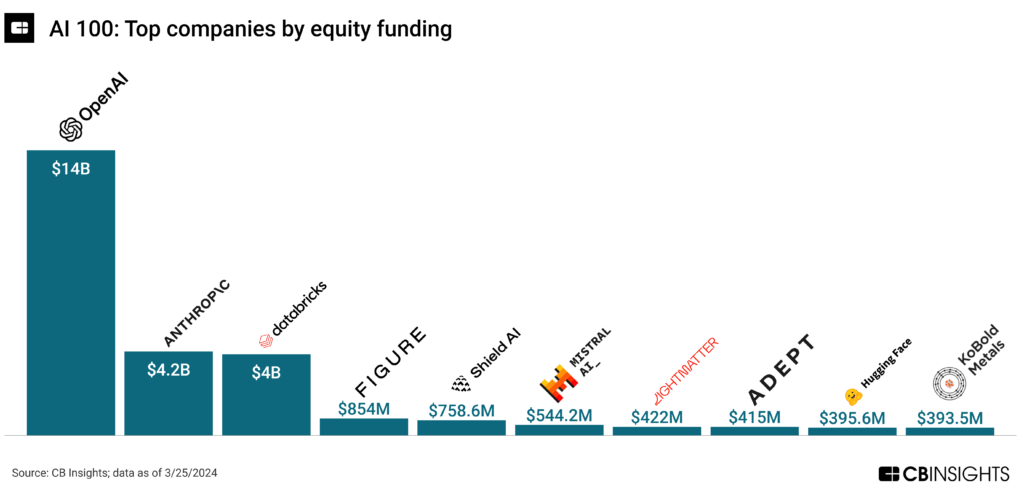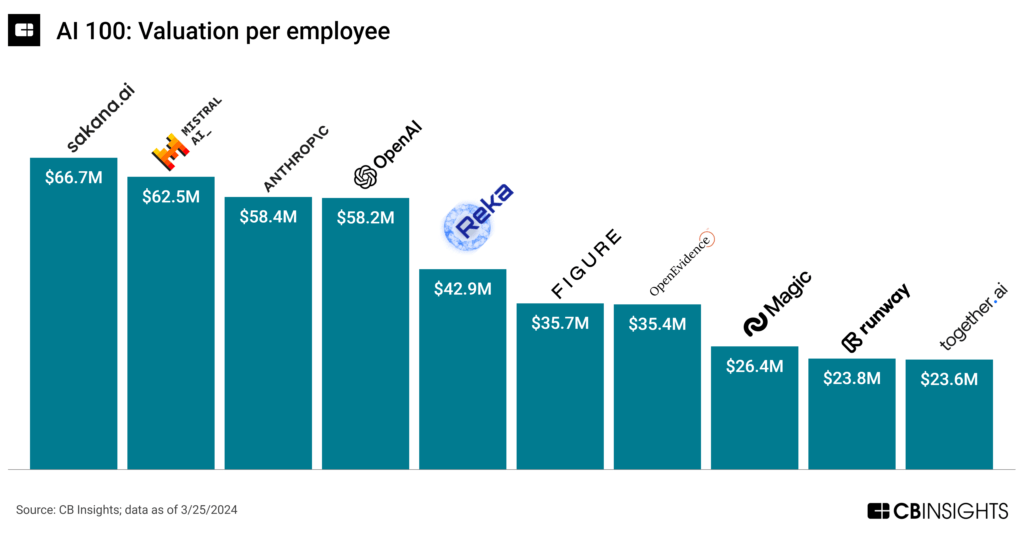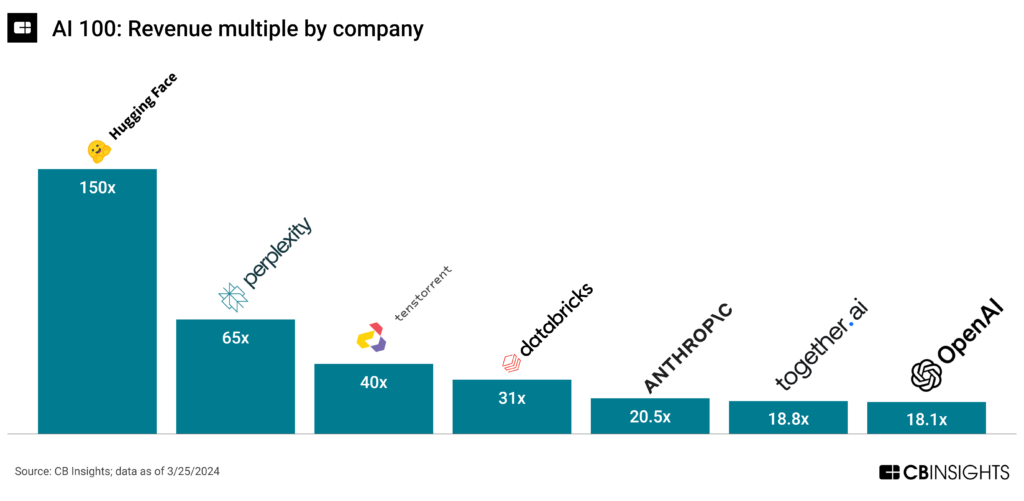CB Insights has unveiled the 8th edition of its AI 100 list, featuring the world’s 100 most promising private AI companies. These companies are making significant strides in tackling some of the most challenging issues across various industries with innovative AI solutions.. CB Insights is launching the 8th annual AI 100 — a ranking of the 100 most promising private AI companies in the world.
This year’s AI 100 highlights include:
- Representation from 16 countries, including the United States, France, and South Africa.
- Over 30 different categories of AI applications, ranging from foundational models to humanoid robots.
- A substantial portion of the list, 68%, comprises early-stage startups that are developing technologies for virtual environments, autonomous production facilities, and language models catering to under-represented languages, among other initiatives.
- Since 2016, these companies have established over 600 business connections with major industry leaders such as Toyota, Netflix, and the World Bank.
The selection process for this prestigious list involved a thorough analysis by CB Insights’ research team. They utilized a variety of data, including deal activity, industry partnerships, team composition, investor profiles, patent filings, and proprietary Mosaic Scores. Additionally, exclusive interviews with software purchasers and direct submissions of Analyst Briefings by startups were also considered in the evaluation.
Please click to enlarge.
CB Insights customers can interact with the entire AI 100 list here and view a detailed category breakdown using the Expert Collection.
2024 AI 100 COHORT HIGHLIGHTS
Funding distribution
The cohort has raised over $28B across 240+ equity deals since 2020 (as of 3/22/24). OpenAI has raised over 40% of that total, with $12B. Meanwhile, 25% of the winning companies have raised less than $10M, with some not having raised any venture funding.
Just over two-thirds (68%) of winning companies are in the early stages of fundraising (seed/angel and Series A) or have yet to raise outside equity.
Valuation trends
This year’s list includes 19 unicorns with a $1B+ valuation.
Meanwhile, Sakana AI — founded by one of the authors of the seminal Google research paper on Transformers — has the highest valuation per employee, at $67M. (It had just 3 employees when it earned its $200M valuation in early 2024.) Sakana is working on new “nature-inspired” AI architectures and recently released 3 Japanese-language models.
Revenue generation
The AI 100 includes a mix of companies at different stages of maturity, product development, and revenue.
Hugging Face, an AI infrastructure platform focused on open-source development, has one of the highest revenue multiples at 150x ($30M in 2023 revenue at a $4.5B valuation). It’s followed by Perplexity, which is developing an alternative to traditional search engines, at 65x (based on a 2023 valuation of $520M and $8M in 2024 ARR).
Midjourney, an image generation platform that has not raised any outside equity, is one of the leading AI 100 winners by revenue with $200M in ARR.
Global reach
A total of 31 winning companies in this year’s cohort are headquartered outside the United States, across 15 other countries. This includes South Africa-based Lelapa AI — which is developing language processing tools for sub-Saharan African languages like Afrikaans, isiZulu, and Sesotho — and Canada-based Ideogram, which is tackling the problem of generating images with legible text.
Europe-based startups account for 19% of the list, including companies headquartered in the United Kingdom, France, and Germany.
Categories & applications
Over one-third of this year’s winners are focused on building core AI infrastructure, from foundation models to AI chips to AI development platforms.
A total of 30 vendors are focused on horizontal (i.e., cross-industry) solutions like coding automation, creator tools, and search, while 34 companies are specializing in verticals like gaming, healthcare, education, and manufacturing.
A handful of winners are building niche applications where the use of AI is not yet commonplace. These include:
- Atomic Industries, which is developing AI for tool and die making in manufacturing and is backed by the venture arms of Porsche, Yamaha, and Toyota
- Rosebud AI, a text-to-game generation startup backed by OpenAI co-founders Ilya Sutskever and Andrej Karpathy, as well as Khosla Ventures
- Flawless AI, a startup developing lip-synced video dubbing for the film industry





8 comments
Somebody essentially lend a hand to make significantly articles Id state That is the very first time I frequented your website page and up to now I surprised with the research you made to make this actual submit amazing Wonderful task
This is a nice blog as well. Your webpage loads quite quickly. Which hosting service are you using? I would like your affiliate link. My webpage should load just as rapidly.
I have been browsing online more than three hours today yet I never found any interesting article like yours It is pretty worth enough for me In my view if all website owners and bloggers made good content as you did the internet will be a lot more useful than ever before
The degree to which I appreciate your creations is equal to your own sentiment. Your sketch is tasteful, and the authored material is stylish. Yet, you seem uneasy about the prospect of embarking on something that may cause unease. I agree that you’ll be able to address this matter efficiently.
Thank you for the good writeup It in fact was a amusement account it Look advanced to far added agreeable from you However how could we communicate
hiI like your writing so much share we be in contact more approximately your article on AOL I need a specialist in this area to resolve my problem Maybe that is you Looking ahead to see you
Fantastic beat I would like to apprentice while you amend your web site how could i subscribe for a blog site The account helped me a acceptable deal I had been a little bit acquainted of this your broadcast offered bright clear concept
Thank you I have just been searching for information approximately this topic for a while and yours is the best I have found out so far However what in regards to the bottom line Are you certain concerning the supply